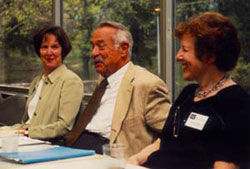BookTalk in Westchester Features Distinguished Alumna Frances O'Connell Rust
At Westchester Community College (WCC) in April, at the invitation of Distinguished Alumnus and WCC President Joseph Hankin, an intimate group gathered to hear another Distinguished Alum, Frances O'Connell Rust, discuss her latest book, Guiding School Change: The Role and Work of Change Agents. This was the BookTalk series' first presentation in the Westchester area.
TC alumnus and WCC Vice President and Dean of Students Julius Ford, who acted as host, introduced BookTalk coordinator Jim Shields. Moderated, as usual, by Richard Heffner of Channel 13's The Open Mind, the talk featured Rust and her co-author Helen Freidus presenting their understanding of what brings about change in schools and how change can be facilitated.
Both women are involved with the professional development of teachers after having worked in early childhood education and special education. "What we are discovering in professional development goes back to what it was like when we were working with very young children," Freidus said. "We thought we could come in and tell them what to do. They had their own ideas. We had to reason and be responsive to them in order to accomplish the goals."
"You develop a climate in which people can ask questions," Rust explained.
A climate of change, the discussion revealed, requires support for change and support for the people who support change. Heffner queried how that support comes about. Freidus responded that it is important to recognize that change takes time to accomplish, and that the people involved must be given that time along with the knowledge, support and authority to do what they have to do.
According to the book, Heffner noted, change in the past was "driven by outside expertise-typically a change agent, more often than not a male who, for a short period of time, comes into a school." Rust and Freidus call for more in the way of social constructivism.
"People need to build their own understandings of time," Freidus said. "People need to share and develop together. When those opportunities were put in place, change lasted."
Rust added, however, that under the influence of the standards movement, teaching is moving in a new direction and that high-stakes testing is working against what the standards are asking for. The criteria for change in the classroom has now come to be based on whether or not the test scores will be going up.
As a result of the pressure to teach to the test, restrictions placed on teachers are causing large numbers of people to leave the profession. "A group of fifth-year veterans came in and said they were thinking about leaving the field," Rust noted. "To me, having watched them grow, this is a great concern. The stresses are too great, and having to teach from a script is too difficult."
Yet, Rust is hopeful that these methods will not last because of the many communities that are rebelling against very rigid curricula adopted based on economics. "Educators and administrators very often forget their role as primary teachers," she said. "They are hired for their educational expertise."
Rust added that bringing parents into the classroom goes a long way toward helping them to see what is really going on in education, and not leaving that role to the press. In doing so, she explained, parents are learning to be advocates for their children. "I think that informing and finding ways to engage the community that we serve in the processes going on in schools" is one way of guiding change that is presented in the book, she said.
Media, Freidus said, can play a big role in creating the atmosphere that allows the development of such rigidity, adding that the press blames researchers for presenting their findings in oblique terminology. Educational researchers, she advised, need to know when "a big story is going to break and get your side in immediately."
Rust added that many people assume that since we all have been in school, we know what is going on in schools, but that is not necessarily the case. "Teachers need to articulate what we are using and why to the community," she said.
While pedagogy doesn't always match the dreams, Freidus concluded, "We can keep striving to get there even though we may never get there. We have to work harder together."
Published Tuesday, Sep. 18, 2001
